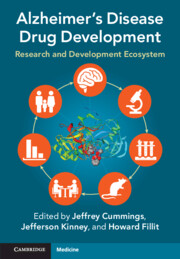Book contents
- Alzheimer’s Disease Drug Development
- Alzheimer’s Disease Drug Development
- Copyright page
- Dedication
- Contents
- Contributors
- Foreword
- Acknowledgments
- Section 1 Advancing Alzheimer’s Disease Therapies in a Collaborative Science Ecosystem
- Section 2 Non-clinical Assessment of Alzheimer’s Disease Candidate Drugs
- Section 3 Alzheimer’s Disease Clinical Trials
- Section 4 Imaging and Biomarker Development in Alzheimer’s Disease Drug Discovery
- Section 5 Academic Drug-Development Programs
- Section 6 Public–Private Partnerships in Alzheimer’s Disease Drug Development
- Section 7 Funding and Financing Alzheimer’s Disease Drug Development
- 41 Financing Alzheimer’s Disease Drug Development
- 42 Valley of Death and the Role of Venture Philanthropy in Alzheimer’s Disease Drug Development
- 43 Alzheimer’s Association Funding and Policy for Alzheimer’s Disease Drug Development
- 44 The Role of Philanthropy in Alzheimer’s Disease Therapeutic Development
- 45 National Institute on Aging’s Alzheimer’s Disease Translational Research Program: Diversifying the Drug-Development Pipeline for the Treatment and Prevention of Alzheimer’s Disease and Related Dementias
- 46 Alzheimer ’s Disease Drug Discovery and the Evolution of Start-Up Biotechnology Companies: Cognition Therapeutics, Inc. as a Case Study
- 47 Introduction to Venture Capital in Alzheimer’s Disease Drug Development
- 48 Federal Small Business Support for Small Businesses Pursuing Alzheimer’s Disease Drug Development
- Index
- References
43 - Alzheimer’s Association Funding and Policy for Alzheimer’s Disease Drug Development
from Section 7 - Funding and Financing Alzheimer’s Disease Drug Development
Published online by Cambridge University Press: 03 March 2022
- Alzheimer’s Disease Drug Development
- Alzheimer’s Disease Drug Development
- Copyright page
- Dedication
- Contents
- Contributors
- Foreword
- Acknowledgments
- Section 1 Advancing Alzheimer’s Disease Therapies in a Collaborative Science Ecosystem
- Section 2 Non-clinical Assessment of Alzheimer’s Disease Candidate Drugs
- Section 3 Alzheimer’s Disease Clinical Trials
- Section 4 Imaging and Biomarker Development in Alzheimer’s Disease Drug Discovery
- Section 5 Academic Drug-Development Programs
- Section 6 Public–Private Partnerships in Alzheimer’s Disease Drug Development
- Section 7 Funding and Financing Alzheimer’s Disease Drug Development
- 41 Financing Alzheimer’s Disease Drug Development
- 42 Valley of Death and the Role of Venture Philanthropy in Alzheimer’s Disease Drug Development
- 43 Alzheimer’s Association Funding and Policy for Alzheimer’s Disease Drug Development
- 44 The Role of Philanthropy in Alzheimer’s Disease Therapeutic Development
- 45 National Institute on Aging’s Alzheimer’s Disease Translational Research Program: Diversifying the Drug-Development Pipeline for the Treatment and Prevention of Alzheimer’s Disease and Related Dementias
- 46 Alzheimer ’s Disease Drug Discovery and the Evolution of Start-Up Biotechnology Companies: Cognition Therapeutics, Inc. as a Case Study
- 47 Introduction to Venture Capital in Alzheimer’s Disease Drug Development
- 48 Federal Small Business Support for Small Businesses Pursuing Alzheimer’s Disease Drug Development
- Index
- References
Summary
Alzheimer’s disease (AD) is a public health challenge that grows in urgency every year. As the world’s largest dedicated voluntary health organization to AD and related dementia (ADRD), the Alzheimer’s Association has a vision of a world without AD and ADRD. In addition to providing care and support in communities across the United States and actively pursuing advocacy for federal research support and community needs,it is committed to advancing vital research toward methods of treatment, prevention, and a cure. In addition to financial support to researchers worldwide, it promotes the sharing of knowledge and data, gathering key stakeholders form the field, including academia, federal, non-profit and industry to advance research (such as through the Alzheimer’s Association International Conference) and accelerating clinical trial research though Alzheimer’s Association TrialMatc. The Association’s funding expands the full spectrum of research, with focused funding on drug development and early-phase human trials.
Keywords
- Type
- Chapter
- Information
- Alzheimer's Disease Drug DevelopmentResearch and Development Ecosystem, pp. 486 - 495Publisher: Cambridge University PressPrint publication year: 2022



